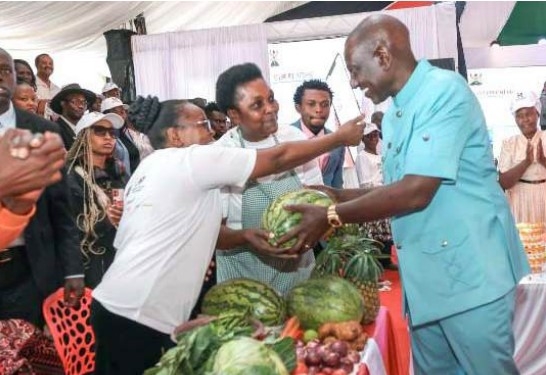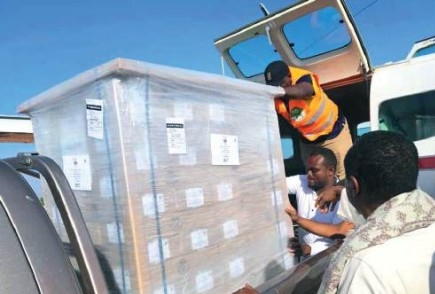For the longest time, thousands of tea farmers in Murang’a county have been depending on tea proceeds to support their families.
This has often led to discontent when prices fluctuate, leaving many reeling in losses and unable to repay advance loans that they normally take from financial institutions to pay for their children’s education.
Despite being in agriculturally-rich areas, many farmers have over the years failed to maximise the use of their farms to produce foodstuff for their families. Instead, they are forced to buy from local markets, further eating into their earnings.
On Monday, however, the farmers were trained on diversifying their agricultural practices to earn more from their farms with aim of finding a solution.
Farmers streamed into a demonstration farm in their hundreds, eager to learn how to boost their tea earnings and what other crops can do well in their areas.
The training was organised by Participatory Ecological Land Use Management association, a network of civil society organisations and NGOs working with small-scale farmers through Organic Agriculture Centre of Kenya.
Mwangi Kagore who travelled from Ndaka-ini in Gatanga subcounty said he was amazed to see how much more a small farm can produce through crop diversification.
“We formed an organic farming group in Ndaka-ini and started producing organic manure but did not know how to maximise its use so we were advised to attend this training,” he said.
Kagore said he was surprised to see a farmer harvest four kilogrammes of tea from one bush while other farmers harvest an average of two to three kilogrames.
This, he said, is because the farmer fed his tea bushes with organic manure on top of the fertiliser supplied by local tea factories.
“Most of us depend on fertiliser alone and when harvests go down, we start complaining that the tea crop has no money when in actual sense, it's just ignorance," he added.
“If this farmer received just Sh30 per kilogramme, they would earn Sh120 from one bush while others get half of that.”
Kagore said such trainings are instrumental in expanding farmers’ knowledge in agricultural practices to help them earn more returns from their farms.
He expressed interest in planting herbs and spices that were showcased in the farm and which occupy little space while at the same time generate more money.
“My farm has a little extra space that I can use to plant some of the herbs to complement my income,” Kagore said.
OACK’s executive director David Karanja said the training was aimed at empowering farmers to diversify income.
He added that tea growing areas have the potential to grow sufficient foodstuff for farmers’ consumption and sale.
The training, Karanja said, also promoted growing of herbs and spices such as paprika, mints, oregano, lemongrass and rosemary, among others, that farmers can consume as medicine while making an extra income.
“We want farmers to be able to maximise local resources. They have been trained on how to make biogas to cut their cooking costs and mitigate the effects of climate change, and see the great potential that their farms hold to boost their living standards.”
Karanja said various companies involved in production of green energy and organic farm inputs were engaged in the training of the farmers.
Wilfred Wanyoike, the zonal representative of HomeBiogas company, explained to curious farmers how they can use two buckets of cow dung to produce enough energy to cook for five hours.
The technology, he said, uses a tube that is put on the surface, and which farmers can service themselves when pipes get clogged.
“You mix the cow dung with just four buckets of water to produce the energy. This means farmers with one or two cows can benefit from it,” Wanyoike added.
Farmers can also get bio-slurry from the used cow dung to alkalinise soils and boost soil fertility, as well as in planting and top dressing to boost crop production.
Wanyoike said the new system costs Sh49,000 but that farmers can pay in monthly instalments after paying an initial instalment of Sh5,000.
“A farmer can chose to pay Sh3,500 monthly for 18 months or Sh4,500 monthly for 12 months,” he said.
Joyce Kairu, a production clerk at Ikumbi tea factory, underscored the need for farmers to embrace organic farming to increase their harvests.
She said the factory has been organising similar training forums to sensitise farmers on how to identify and manage tea crop diseases and that they discourage going to agrovets to buy chemicals.
“We ask farmers to engage our extension officers who then advise them on how to handle the diseases instead of buying chemicals that may end up lowering the grade of their tea,” Kairu added.
The factory, she said, has installed an orthodox plant to add value to its tea and has been encouraging farmers to consume tea flavoured with spices such as ginger that it produces.
Amica Sacco’s agribusiness manager John Kariuki said the firm sponsored the training to help empower tea farmers who are the founder members.
The event also saw farmers trained on financial management so they can use their proceeds to grow themselves.
Kariuki said many farmers go home empty-handed every time annual bonuses are paid due to low proceeds.
“Tea farmers at times default on their loans when prices fluctuate and we have to reschedule them. Diversification would help them get an extra income,” he said, adding that farmers were urged to renew their tea crops that have been in use for decades.
Sarah Wambui, Pelum’s zonal coordinator in Central and Nairobi regions, said the organisation is currently working with 18 other entities to reach small-scale farmers.
The organisation sensitises the growers on their rights and lobbies for policies that empower them at the county and national level.
“When Murang’a county passed the agroecology policy, we were part of that along with other organisations,” Wambui said.






![[PHOTOS] Three dead, 15 injured in Mombasa Rd crash](/_next/image?url=https%3A%2F%2Fcdn.radioafrica.digital%2Fimage%2F2025%2F11%2Fa5ff4cf9-c4a2-4fd2-b64c-6cabbbf63010.jpeg&w=3840&q=100)










